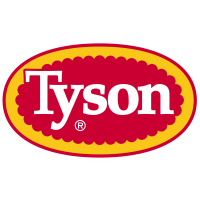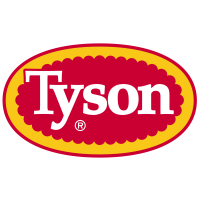
Tyson Foods Inc
NYSE:TSN

Intrinsic Value
The intrinsic value of one
 TSN
stock under the Base Case scenario is
87.07
USD.
Compared to the current market price of 60.43 USD,
Tyson Foods Inc
is
Undervalued by 31%.
TSN
stock under the Base Case scenario is
87.07
USD.
Compared to the current market price of 60.43 USD,
Tyson Foods Inc
is
Undervalued by 31%.
The Intrinsic Value is calculated as the average of DCF and Relative values:

Valuation History
Tyson Foods Inc

Fundamental Analysis

Persistently high feed costs and ongoing supply chain disruptions may compress meat processing margins, hindering Tyson’s profitability and limiting near-term earnings growth.
Tyson’s diversified protein portfolio, spanning chicken, beef, pork, and value-added products, provides resilience against single-segment downturns and positions the firm to capture shifting consumer demand.

Revenue & Expenses Breakdown
Tyson Foods Inc

Balance Sheet Decomposition
Tyson Foods Inc

| Current Assets | 10.1B |
| Cash & Short-Term Investments | 2.3B |
| Receivables | 2.3B |
| Other Current Assets | 5.5B |
| Non-Current Assets | 27.2B |
| PP&E | 9.4B |
| Intangibles | 15.6B |
| Other Non-Current Assets | 2.3B |
Free Cash Flow Analysis
Tyson Foods Inc

| USD | |
| Free Cash Flow | USD |
Earnings Waterfall
Tyson Foods Inc

|
Revenue
|
53.6B
USD
|
|
Cost of Revenue
|
-49.5B
USD
|
|
Gross Profit
|
4.1B
USD
|
|
Operating Expenses
|
-2.1B
USD
|
|
Operating Income
|
2B
USD
|
|
Other Expenses
|
-939m
USD
|
|
Net Income
|
1.1B
USD
|
TSN Profitability Score
Profitability Due Diligence

Tyson Foods Inc's profitability score is 44/100. The higher the profitability score, the more profitable the company is.

Score
Tyson Foods Inc's profitability score is 44/100. The higher the profitability score, the more profitable the company is.
TSN Solvency Score
Solvency Due Diligence

Tyson Foods Inc's solvency score is 56/100. The higher the solvency score, the more solvent the company is.

Score
Tyson Foods Inc's solvency score is 56/100. The higher the solvency score, the more solvent the company is.
Wall St
Price Targets
TSN Price Targets Summary
Tyson Foods Inc

According to Wall Street analysts, the average 1-year price target for
 TSN
is 67.83 USD
with a low forecast of 58.58 USD and a high forecast of 83.42 USD.
TSN
is 67.83 USD
with a low forecast of 58.58 USD and a high forecast of 83.42 USD.
Dividends
Current shareholder yield for  TSN is
.
TSN is
.
Shareholder yield represents the total return a company provides to its shareholders, calculated as the sum of dividend yield, buyback yield, and debt paydown yield. What is shareholder yield?
The intrinsic value of one
 TSN
stock under the Base Case scenario is
87.07
USD.
TSN
stock under the Base Case scenario is
87.07
USD.
Compared to the current market price of 60.43 USD,
 Tyson Foods Inc
is
Undervalued by 31%.
Tyson Foods Inc
is
Undervalued by 31%.























































 You don't have any saved screeners yet
You don't have any saved screeners yet